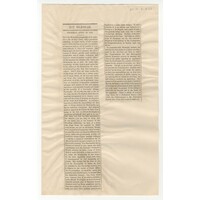Untitled
Metadata
Untitled
Publications & Reports
The size and complex demography of Cape Town makes its municipal arrangements troublesome to implement. The summer climate creates further problems for the municipality (like veld fires). Fewer land-owning, economic elite appear willing to devote themselves to public affairs (i.e. unsalaried positions), quickening the municipality's stagnation. While their efforts are commendable, a capable fire brigade is urgently needed to mitigate the risk of seasonal property damage. While disaster prevention and mitigation may benefit insurance companies, this duty is wholly municipal. Many Cape Town dwellings are not insured. Those insured are split across various local and foreign insurers, complicating the fair financing of such a fire service. The current firefighting approach to containment and extinguishment in South Africa's capital is unsatisfactory. Currently, "fire-fighters" are more dreaded than the fire itself. Such a brigade must be exclusively of European descent. The competence of "European" military men fighting the fire (April 15th, 1866) in Longmarket Street confirms this. Despite the Malay's usefulness, they lack order and nerve. Elsewhere, fire brigades are an honourable association. Municipal commissioners have deflected decision-making onto the public by requesting feedback on the government's application to enlarge the main barracks with a portion of Caledon Square. The application is too reasonable to refuse, and a permanent garrison benefits the city. Despite being Saul Solomon's favourite site, Parliament House can stand elsewhere.
Printed newsprint glued on paper
19/04/1866
Two cut out columns of newsprint text, positioned vertically parallel, pasted onto a plus-sized A4 unlined sheet with visible warping. No title was subsequently handwritten onto the mount/paper backing.


Contributions